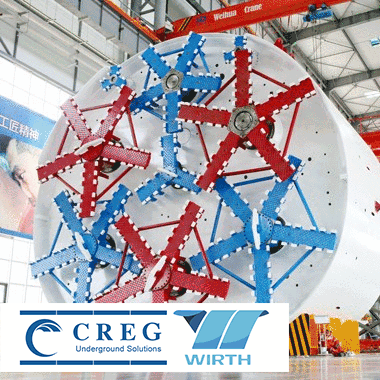UK hyperloop viability challenge 31 Jan 2019
The concept of hyperloop transportation at up to 1,200km/hr in pods propelled by maglev in vacuum environments in pipelines envisages excavation of extensive underground networks. Viability of such underground hyperloop systems would rely heavily on the cost of tunnelling. Elon Musk and his Hyperloop One company, as one of several hyperloop system developers, has suggested that the concept is viable only if the cost of tunnelling is reduced by a factor of ten or more. His thoughts on achieving that include by excavating smaller diameter tunnels, doubling the power of tunnel boring machines, using a continuous excavation and lining process, and by investing in R&D and taking advantages of economies of scale.
Taking note of these claims and suggestions, the British Tunnelling Society (BTS) of the Institution of Civil Engineers (ICE) in the UK, has set a challenge to investigate the feasibility and practicalities of building a hyperloop system for the UK.
The BTS Hyperloop Challenge will look at the technical implications and advantages of building tunnels for hyperloop systems and look at the cost drivers of tunnelling and the feasibility of cutting those costs. The BTS will also look at current innovations and research projects that may help in achieving technical feasibility and the desired cost reductions.
The Challenge project is being part funded by the ICE Enabling Fund, will comprise a preliminary report that will be used to brief an industry-wide workshop to be held at the ICE headquarters in Great George Street, London. The output of the workshop will be integrated with the preliminary research to produce the final report for planned publication in Autumn 2019. The research work and reporting work for the project is to be carried out by UK consultant firm London Bridge Associates.
“These are challenging questions to answer, but ones that we feel require considered thought by subject matter experts,” said BTS Project Director Bill Grose. “There is already considerable enthusiasm to participate in the Challenge project both from within as well as outside the tunnelling community.”
Simon Morgan, Managing Director of London Bridge Associates and leading the work on the project, said: “We are thrilled to be a part of this project and have the opportunity to bring together industry knowledge and experience to show how the tunnelling industry can take a leading part in the implementation of a hyperloop concept and maximise the benefits of the underground environment.”
Further information or expressions of interest are to be emailed to hyperloop@britishtunnelling.org.uk
References
- Underground travel at the speed of sound competition – TunnelTalk, October 2017
- Musk talks tunnelling concepts – TunnelTalk, May 2017
- Industry leaders comment on Musk attention in tunnelling – TunnelTalk, Feedback
- Two generations of tunnelling at Herrenknecht include opinion on Musk initiatives – TunnelTalk, September, 2018
|
|
|
|
|
Add your comment
- Thank you for taking the time to share your thoughts and comments. You share in the wider tunnelling community, so please keep your comments smart and civil. Don't attack other readers personally, and keep your language professional.


